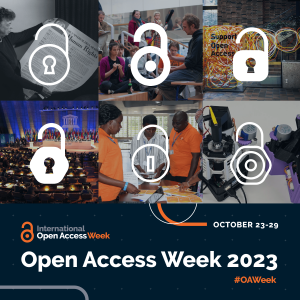Oct
20

Posted by Carolann Curry on October 20th, 2023
Posted in: Blog, Data Science
 International Open Access Week is observed each year during the last full week in October. This year’s theme is “Community over Commercialization” and promotes the discussion of prioritizing the best interests of the public through open scholarship. A 2021 report released by the Scholarly Publishing and Academic Resources (SPARC) estimated that American taxpayers contributed more than $80 funding science research, however due to paywalls, many were not able to access that research. Thanks to a policy implemented in 2022 by the White House Office of Science & Technology Policy (OSTP), all federally-funded research now must be free to access and made publicly available immediately after it’s published.
International Open Access Week is observed each year during the last full week in October. This year’s theme is “Community over Commercialization” and promotes the discussion of prioritizing the best interests of the public through open scholarship. A 2021 report released by the Scholarly Publishing and Academic Resources (SPARC) estimated that American taxpayers contributed more than $80 funding science research, however due to paywalls, many were not able to access that research. Thanks to a policy implemented in 2022 by the White House Office of Science & Technology Policy (OSTP), all federally-funded research now must be free to access and made publicly available immediately after it’s published.
The National Institutes of Health (NIH) enthusiastically supports open access in biomedical sciences and public health research. In 2008, the NIH released a Public Access Policy that mandates that research funded from NIH support be made publicly available in PubMed Central (PMC), the National Library of Medicine (NLM)’s free online archive and repository. And just earlier this year, the NIH released a Data Management and Sharing Policy which promotes the open sharing of scientific data. This policy offers best practices on how researchers can create data management plans, guidance on how to select the most appropriate repository for sharing data, and information on how to budget for data management and sharing activities.
Below is a collection of NIH, NLM, and NNLM resources on open access, as well as some additional resources from open access allies. For those looking to learn more about open access, check out the NNLM Class Catalog for upcoming classes, as well as recordings of past webinars, and on-demand courses.
NIH, NLM, and NNLM Resources on Open Access
Other Resources on Open Access
Directory of Open Access Journals (DOAJ)
An independent database of over 15,000 peer-reviewed open access journals in the areas of science, technology, medicine, social sciences, and the arts and humanities.
International Federation of Library Associations and Institutions (IFLA): 10 Years of the Open Access Statement
This 2022 document reviews the steps taken towards the vision articulated by IFLA in 2011 and identifies new areas in need of urgent action. Libraries provide critical support for the development of Open Access as a societal good. Libraries are uniquely positioned to support the equitable and inclusive development of publishing opportunities, including serving as infrastructure for publishing initiatives and educating authors about pathways for publishing their works open access.
Sherpa Fact
Sherpa Fact provides clear guidance to researchers on whether a journal complies with a funder’s open access policies.
Sherpa Romeo
Sherpa Romeo enables researchers and librarians to see publishers’ conditions for open access archiving on a journal-by-journal basis.
Sherpa Juliet
Sherpa Juliet enables researchers and librarians to see funders’ conditions for open access publication.
Sherpa OpenDOAR
OpenDOAR enables the identification, browsing and search for repositories.
SPARC
A non-profit advocacy organization that supports systems for research and education that are open by default and equitable by design.